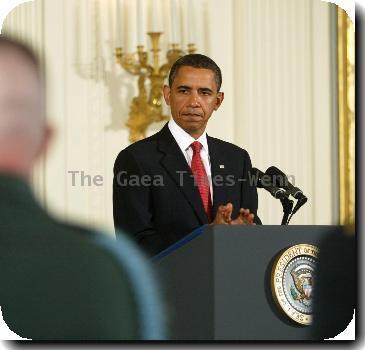Military families have mixed feelings on Afghanistan surge strategy outlined in Obama speech
By Kevin Maurer, APTuesday, December 1, 2009
Troops, families mixed over Obama’s Afghan surge
JACKSONVILLE, N.C. — Battle-weary troops and their families braced for a wrenching round of new deployments to Afghanistan, but many said they support the surge announced Tuesday as long as it helps to end the 8-year-old conflict.
As President Barack Obama outlined his plan to send 30,000 extra troops to Afghanistan — while pledging to start bringing them home in 2011 — soldiers, Marines and their families interviewed by The Associated Press felt a tangle of fresh concerns and renewed hopes. Some took in the televised announcement as they played darts in a barroom near their base, while others watched from their living rooms.
“All I ask that man to do, if he is going to send them over there, is not send them over in vain,” said 57-year-old Bill Thomas of Jacksonville, N.C., who watched Obama’s televised speech in his living room, where photos of his three sons in uniform hang over the TV.
One of his sons, 23-year-old Cpl. Michael Thomas, is a Marine based at neighboring Camp Lejeune. He’ll deploy next year to Afghanistan.
An ex-Marine himself, Thomas said he supports Obama’s surge strategy. But he shook his head when the president announced a 2011 transition date to begin pulling out troops.
“If I were the enemy, I would hang back until 2011,” Thomas said. “We have to make sure that we are going go stay until the job is done. It ain’t going to be as easy as he thinks it is.”
Military officials say the Army brigades most likely to be sent as part of the surge will come from Fort Drum in New York and Fort Campbell in Kentucky. Marines, who will be the vanguard, will most likely come primarily from Camp Lejeune.
As the wife of a Marine stationed at Camp Lejeune, where some of the first surge units could deploy by Christmas, Jamie Copeland says she wished the war “would be over and done with.”
Copeland’s husband, Sgt. Doug Copeland, is already scheduled to return to Afghanistan later this fall. She hates to see him go — he just returned from his last seven-month tour in August — and miss more time with their 1-year-old son. But she also concedes that American forces need more help fighting Taliban insurgents.
“We need to be in Afghanistan,” said Copeland, 24. “Our Marines are getting slaughtered out there. I would say we need more out there. Iraq is done.”
At the John Hoover Inn, a bar in Evans Mills, N.Y., near Fort Drum, a dozen soldiers watched the speech on a large-screen TV, drinking beer out of red cups. When Obama announced the troop increase, only one cheered, and the rest remained silent. They continued to play darts while the president was speaking.
“I’m just relieved to know where we’re going,” said Spc. Adam Candee, 29, of Chicago.
Theresa McCleod said she worries what Obama’s plans might mean for her husband, a soldier in the 10th Mountain Division at Fort Drum. She said he’s already done a long combat tours in Afghanistan and Iraq, leaving her to care for their three children.
“First he was supposed to be pulling everyone out, and now all the sudden he’s throwing everybody back into Afghanistan and it’s like nobody can really make up their minds,” McCleod said of Obama.
Obama’s plan calls for deploying 30,000 troops to Afghanistan in the next six months, boosting total U.S. forces there to about 100,000. The first waves of Marines are expected to arrive by Christmas, with the rest coming by summer.
The president also began outlining an endgame to the war, saying troops would begin pulling out of Afghanistan in July 2011 — though he did not say when a withdrawal could be completed.
Army 1st Lt. Emily Stahl, who is preparing to deploy from Fort Campbell next spring, said she’s not going to focus on the timetable.
“We have to get the job done,” Stahl, 24, said after watching the speech from her home outside the Army post, where she serves in the 101st Airborne Division. “If we do what we’re supposed to do, the end of the war will come when it comes.”
At home with her two young children in rural Byron, Ga., Traci Watson hopes the surge does work — and brings a swift end to the war.
Her husband, Army Staff Sgt. Dwayne Watson, is midway through a yearlong tour in Afghanistan with the Georgia National Guard’s 48th Infantry Brigade, which has 2,400 troops helping to train Afghan security forces. While she’s a little concerned the surge could delay her husband coming home around March, she also hopes it means he won’t have to deploy again.
“There’s always the worry that his orders might be extended and he might have to help transition between the ones they have coming and the ones that are leaving,” Watson said. “But if staying an extra 30 or 60 days meant he wouldn’t have to be gone from our family a year later, absolutely.”
Bynum reported from Savannah, Ga. Associated Press writers Ted Shaffrey at Fort Drum, N.Y., and Kristin Hall in Clarksville, Tenn., contributed to this report.
Tags: Afghanistan, Asia, Barack Obama, Central Asia, Christmas, Iraq, Jacksonville, Middle East, New York, North America, North Carolina, Obama, Troop Deployments, United States





